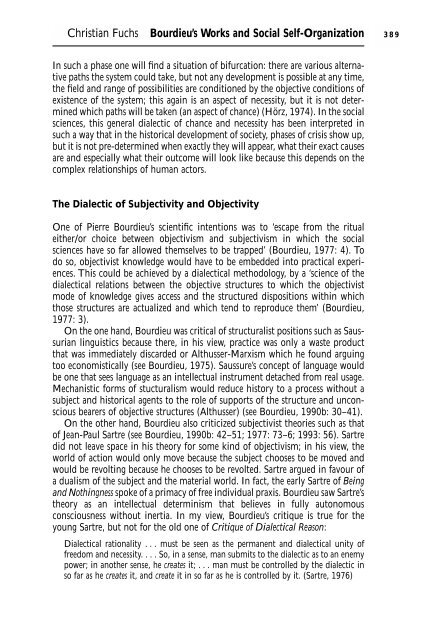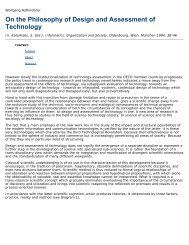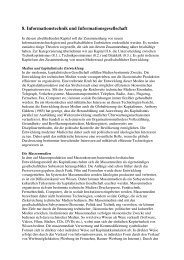Some Implications of Pierre Bourdieu's Works for a Theory of Social ...
Some Implications of Pierre Bourdieu's Works for a Theory of Social ...
Some Implications of Pierre Bourdieu's Works for a Theory of Social ...
Create successful ePaper yourself
Turn your PDF publications into a flip-book with our unique Google optimized e-Paper software.
Christian Fuchs Bourdieu’s <strong>Works</strong> and <strong>Social</strong> Self-Organization 389In such a phase one will find a situation <strong>of</strong> bifurcation: there are various alternativepaths the system could take, but not any development is possible at any time,the field and range <strong>of</strong> possibilities are conditioned by the objective conditions <strong>of</strong>existence <strong>of</strong> the system; this again is an aspect <strong>of</strong> necessity, but it is not determinedwhich paths will be taken (an aspect <strong>of</strong> chance) (Hörz, 1974). In the socialsciences, this general dialectic <strong>of</strong> chance and necessity has been interpreted insuch a way that in the historical development <strong>of</strong> society, phases <strong>of</strong> crisis show up,but it is not pre-determined when exactly they will appear, what their exact causesare and especially what their outcome will look like because this depends on thecomplex relationships <strong>of</strong> human actors.The Dialectic <strong>of</strong> Subjectivity and ObjectivityOne <strong>of</strong> <strong>Pierre</strong> Bourdieu’s scientific intentions was to ‘escape from the ritualeither/or choice between objectivism and subjectivism in which the socialsciences have so far allowed themselves to be trapped’ (Bourdieu, 1977: 4). Todo so, objectivist knowledge would have to be embedded into practical experiences.This could be achieved by a dialectical methodology, by a ‘science <strong>of</strong> thedialectical relations between the objective structures to which the objectivistmode <strong>of</strong> knowledge gives access and the structured dispositions within whichthose structures are actualized and which tend to reproduce them’ (Bourdieu,1977: 3).On the one hand, Bourdieu was critical <strong>of</strong> structuralist positions such as Saussurianlinguistics because there, in his view, practice was only a waste productthat was immediately discarded or Althusser-Marxism which he found arguingtoo economistically (see Bourdieu, 1975). Saussure’s concept <strong>of</strong> language wouldbe one that sees language as an intellectual instrument detached from real usage.Mechanistic <strong>for</strong>ms <strong>of</strong> stucturalism would reduce history to a process without asubject and historical agents to the role <strong>of</strong> supports <strong>of</strong> the structure and unconsciousbearers <strong>of</strong> objective structures (Althusser) (see Bourdieu, 1990b: 30–41).On the other hand, Bourdieu also criticized subjectivist theories such as that<strong>of</strong> Jean-Paul Sartre (see Bourdieu, 1990b: 42–51; 1977: 73–6; 1993: 56). Sartredid not leave space in his theory <strong>for</strong> some kind <strong>of</strong> objectivism; in his view, theworld <strong>of</strong> action would only move because the subject chooses to be moved andwould be revolting because he chooses to be revolted. Sartre argued in favour <strong>of</strong>a dualism <strong>of</strong> the subject and the material world. In fact, the early Sartre <strong>of</strong> Beingand Nothingness spoke <strong>of</strong> a primacy <strong>of</strong> free individual praxis. Bourdieu saw Sartre’stheory as an intellectual determinism that believes in fully autonomousconsciousness without inertia. In my view, Bourdieu’s critique is true <strong>for</strong> theyoung Sartre, but not <strong>for</strong> the old one <strong>of</strong> Critique <strong>of</strong> Dialectical Reason:Dialectical rationality . . . must be seen as the permanent and dialectical unity <strong>of</strong>freedom and necessity.... So, in a sense, man submits to the dialectic as to an enemypower; in another sense, he creates it; . . . man must be controlled by the dialectic inso far as he creates it, and create it in so far as he is controlled by it. (Sartre, 1976)





